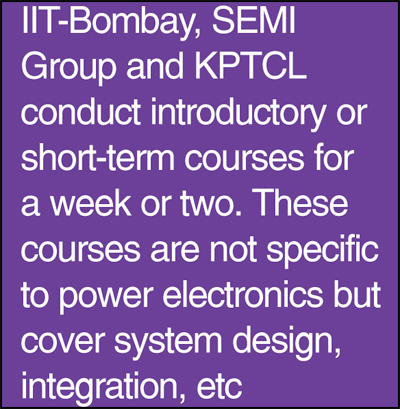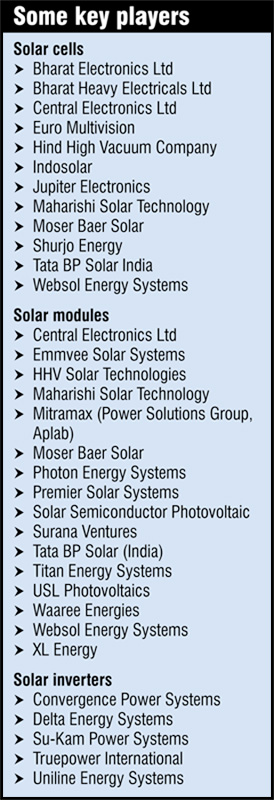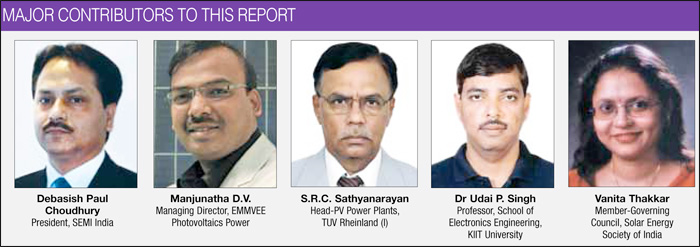If aiming for production management, you should be a BE or B.Tech in electronics/instrumentation/mechatronics or M.Sc. in physics/electronics with experience in a manufacturing environment—preferably in the electronics or light engineering industry. Candidates with experience in semiconductor devices, solar photovoltaic cells or modules manufacturing are preferred. A good insight of modern manufacturing practices and prior work experience in a systems based environment are desirable.
For project management, you should have experience in turnkey project management in a manufacturing industry. Prior experience in handling major projects under challenging conditions is desirable.
 Where to study
Where to study
The solar PV industry is in a very nascent stage and the infrastructure not completely built in India. However, with the rapid development of this industry, there will be requirement of fresh graduates and postgraduates who can be trained in the respective areas.
There is a huge talent crunch as few colleges or institutes offer courses dedicated to solar energy or renewable energy. However, there are about 25 institutes in India offering courses in energy studies, with renewable energy as one of the subjects.
Most of the courses in renewable energy are available at the master’s level. Some of the institutes and universities offering these courses are Department of Energy Science & Engineering, IIT Mumbai; Center of Energy Studies, IIT, New Delhi; School of Energy Studies, Jadavpur Univeristy, Kolkata; Department of School of Energy Studies, University of Pune; TERI University, New Delhi; University of Lucknow; and Pandit Deendayal Petroleum University (Gandhinagar, Gujarat). Outside India, University of Dundee in Scottland and University of Nottingham in England also offer this course.
Also, there are centres of energy studies where specialisation in renewable energy or solar PV can be pursued. Pandit Deendayal Petroleum University has a School of Solar Energy which offers courses in solar technology. Many universities offer alternative energy sources as an elective for final year of the four-year graduate-level programme.
IIT-Bombay, SEMI Group and KPTCL conduct introductory or short-term courses for a week or two. These courses are not specific to power electronics but cover system design, integration, etc.
To bridge the short-term resource gap, SEMI India has launched a solar skill development programme in collaboration with the National Centre for Photovoltaic Research and Education (NCPRE) based at IIT-Bombay. These are short-term technical training courses, three days in duration, conducted by faculty drawn from IIT-Bombay and solar industry. SEMI India is also going to hold a short-term course on off-grid solar PV components and systems at India Habitat Centre, New Delhi, on April 11-13, 2012.
 Career growth over the years
Career growth over the years
Entry-level positions start from trainee engineers in manufacturing, system and project design, installation, operation and maintenance, procurement, etc. You can progress from the level of assistant manager to manager and general manager level both in production and R&D.
A fresher or trainee engineer can earn Rs 20,000-25,000 a month. However, if you have graduated from a reputed engineering college or have a master’s degree, you can earn anywhere between Rs 35,000 and Rs 40,000 a month depending on your individual skillset. Currently, professionals with eight to ten years of experience in the solar industry earn Rs 2-2.5 million per annum. Entry-level positions start from trainee engineers in manufacturing, system and project design, installation, operation and maintenance, procurement, etc. You can progress from the level of assistant manager to manager and general manager level both in production and R&D. A fresher or trainee engineer can earn Rs 20,000-25,000 a month. However, if you have graduated from a reputed engineering college or have a master’s degree, you can earn anywhere between Rs 35,000 and Rs 40,000 a month depending on your individual skillset. Currently, professionals with eight to ten years of experience in the solar industry earn Rs 2-2.5 million per annum.

Key to success
The key to a successful career in the solar industry is “Learning by doing.” You can do that by continuing research and training, attending conferences and events, joining local and national groups, reading industry magazines and websites, making personal contacts and volunteering to show commitment. In short, sound technical knowledge, awareness about latest developments and dynamics of the field along with a passion for renewable energy technology will help you get going. The key to a successful career in the solar industry is “Learning by doing.” You can do that by continuing research and training, attending conferences and events, joining local and national groups, reading industry magazines and websites, making personal contacts and volunteering to show commitment. In short, sound technical knowledge, awareness about latest developments and dynamics of the field along with a passion for renewable energy technology will help you get going.
The author is an executive editor at EFY









